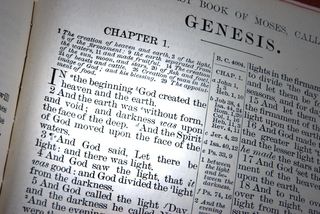NASA Intelligent Design Case Goes to Court

Opening statements are set for today (March 12) in the case of a NASA computer specialist who alleges that he was fired from his job at the Jet Propulsion Laboratory because of his belief in intelligent design.
David Coppedge, who worked for 15 years on the Cassini mission exploring Saturn, also runs a website called Creative-Evolution headlines and serves on the board of Illustra Media, a company that produces videos on intelligent design, the idea that the universe is too complex not to involve an intelligent creator. Several of these videos play a role in Coppedge's wrongful termination lawsuit.
According to Coppedge's complaint first filed with the courts in April 2010, JPL supervisors reprimanded Coppedge for handing out intelligent design DVDs to coworkers and discussing his beliefs about intelligent design with them. Coppedge alleges that JPL stifled his right to free speech and created a hostile work environment, demoting him from his "team lead" position in 2009. Coppedge lost his job last year.
"Plaintiff contends that, as a direct and proximate result of Defendants' conduct and actions, he has been prejudiced and harmed as the result of Defendants' actions suppressing and constraining protected speech in the workplace on account of viewpoint, content and religion," reads Coppedge's complaint filed at the Los Angeles Superior Court in 2010. The complaint has since been updated to include Coppedge's termination.
According to JPL, it was not Coppedge's beliefs, but his conflicts with colleagues that led to his demotion. The lab also holds that Coppedge's firing was the result of planned budget cuts, not his intelligent design beliefs.
According to Coppedge's complaint, his supervisors told him that his discussions of intelligent design and distribution of DVDs "amounted to 'pushing religion' and were 'unwelcome' and 'disruptive.'" [8 Ways Religion Impacts Your Life]
According to the Gallup polling organization, as of 2010, 38 percent of Americans believed that humans evolved with God's guidance, a position roughly congruous with intelligent design. Forty percent said they believed that God created humans in their present form, while 16 percent said they believed that humans evolved without God's hand.
Sign up for the Live Science daily newsletter now
Get the world’s most fascinating discoveries delivered straight to your inbox.
The Pew Research Center, which asked people about evolution and intelligent design using slightly different phrasing than Gallup, finds that people are often confused over origin-of-life issues, however. In 2005, the organization found that about 58 percent of Americans said the biblical account of creation was definitely or probably true, but the same percentage also said the same of evolution. In August 2005, a Gallup poll found that only 52 percent of Americans knew what the term "intelligent design" meant.
One study published in January found that people's acceptance of evolution depends on their gut feeling rather than a careful examination of the evidence.
Nonetheless, evolution, creationism and intelligent design remain hot political topics. Legislators in several states introduced legislation this year that would limit the teaching of evolution or promote instruction in creationism.
You can follow LiveScience senior writer Stephanie Pappas on Twitter @sipappas. Follow LiveScience for the latest in science news and discoveries on Twitter @livescience and on Facebook.

Stephanie Pappas is a contributing writer for Live Science, covering topics ranging from geoscience to archaeology to the human brain and behavior. She was previously a senior writer for Live Science but is now a freelancer based in Denver, Colorado, and regularly contributes to Scientific American and The Monitor, the monthly magazine of the American Psychological Association. Stephanie received a bachelor's degree in psychology from the University of South Carolina and a graduate certificate in science communication from the University of California, Santa Cruz.
Most Popular

